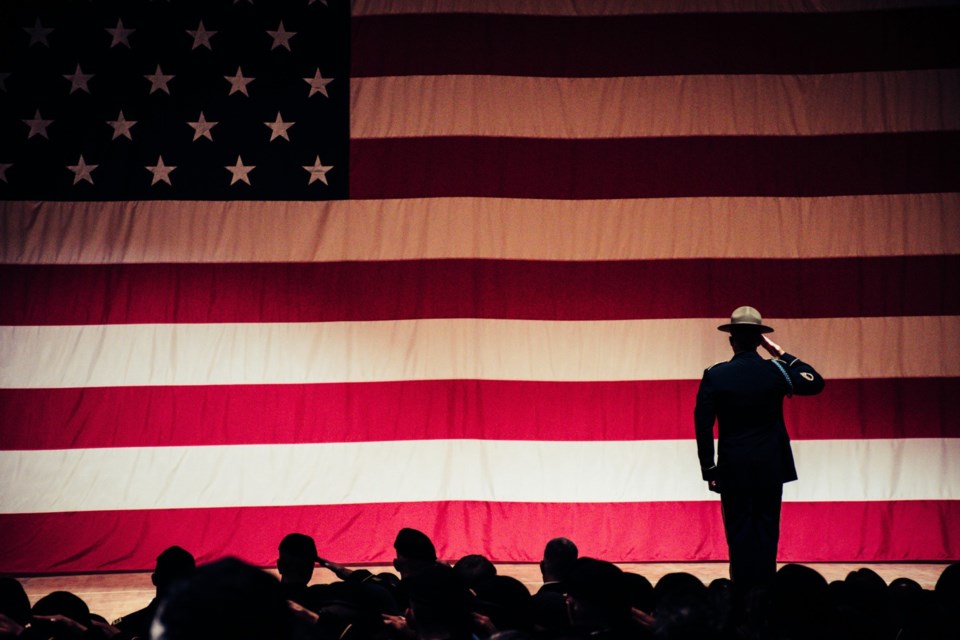On a recent nine-day journey from Edmonton, Alberta, to Long Island, New York, and Winston-Salem, North Carolina, I had the opportunity to reflect on the cultural differences between the United States and Canada, as well as the unique aspects of American society. This trip, centred around the 65th reunion of my high school classmates, offered a perspective that not only highlighted the deep patriotism of Americans but also revealed the challenges and contrasts faced by both nations, especially in the context of a looming Canadian federal election.
One of the first observations I made during my travels was the overwhelming display of the American flag. It seemed to fly everywhere – on homes, businesses, and public buildings – a symbol of pride, unity, and a shared identity. This widespread display of national pride stood out, especially when compared to Canada, where such displays are less frequent.
In the U.S., this patriotism isn’t just about the flag. It is deeply rooted in the way Americans honour their military. Monuments and memorials to fallen soldiers, conversations about veterans’ sacrifices, and tributes are woven into the fabric of everyday life. It reminded me of Abraham Lincoln’s words, “Great nations honour their heroes.”
Equally striking was the cleanliness of the environment. Beaches, streets, and public spaces were impressively maintained, reflecting a shared respect for the environment. This cleanliness, combined with strong volunteerism in communities, demonstrated the pride Americans take in their towns and cities. Small businesses lined the streets of rural towns, their presence a testament to the entrepreneurial spirit and family-owned enterprises that still thrive in America despite the dominance of big corporations.
Beyond the outward displays of patriotism and environmental care, what struck me most was the warmth and openness of the people I encountered. There was a pervasive sense of inclusivity and hospitality in small towns like Warwick and Sayville, New York, and even in more niche communities like Cherry Grove on Fire Island. People showed kindness toward strangers in small shops, restaurants, or even bustling airports. It was more than just politeness; it was a genuine attentiveness that manifested in exceptional customer service and a welcoming atmosphere.
In contrast, Canadian interactions often feel more reserved. While Canadians are known for being polite, the overt warmth and inclusivity I encountered in the U.S. felt distinct. It was refreshing to experience such openness, humour, and care, no matter the setting.
However, amidst the warmth and hospitality, there was also an undercurrent of tension, driven by the upcoming presidential election. Conversations about the election were often guarded, with many people hesitant to discuss politics openly. When the topic did come up, it was clear that many Americans were frustrated by the personal attacks and disinformation surrounding the candidates.
Media coverage was omnipresent, shaping narratives throughout the day as the nation grappled with a highly polarized political atmosphere. The tension was palpable, and many expressed shock at the near-violent rhetoric that had become commonplace in the political discourse. It was far from the respectful, policy-focused debates that one might expect in a presidential election.
During my stay, major news stories dominated the media, including the vice-presidential debate, a devastating hurricane, and an Iranian missile launch. These events, coupled with the election, created a heightened sense of uncertainty and anxiety. It was a stark contrast to the more subdued and reserved political climate in Canada, where election campaigns, while important, do not seem to consume the national conversation to the same extent.
As my journey took me from Warwick to Sayville and Fire Island to Winston-Salem, I was struck by both the contrasts and the commonalities between the U.S. and Canada. The U.S. exudes a sense of dynamism, driven by its diverse communities, entrepreneurial spirit, and strong sense of identity. Yet, it also faces significant challenges, from political polarization to the pressures of maintaining a balanced relationship with its ideals.
In Canada, we often pride ourselves on being more moderate and reserved, but there are lessons to be learned from the vibrancy and openness of American society. At the same time, the political divisiveness in the U.S. serves as a cautionary tale. While Canadians are not immune to polarization, the U.S. experience highlights the importance of maintaining civil discourse and focusing on substantive policy debates rather than personal attacks.
Ultimately, my nine-day journey through small-town America offered a glimpse into the soul of a nation. Despite the challenges – political, social, and environmental – there remains a deep commitment to the ideals that define the American experience. From the respect for military service to the entrepreneurial energy of small businesses, the U.S. continues to be a land of opportunity, resilience, and hope.
As I returned to Edmonton, the contrasts and similarities between our two nations felt more pronounced than ever. While our countries may differ in many ways, we share common values – freedom, community, and a desire for a better future. Understanding and appreciating these differences and commonalities can help foster greater respect and co-operation between our nations, especially in a world where unity and collaboration are more important than ever.
Dr. Perry Kinkaide is a visionary leader and change agent. Since retiring in 2001, he has served as an advisor and director for various organizations and founded the Alberta Council of Technologies Society in 2005. Previously, he held leadership roles at KPMG Consulting and the Alberta Government. He holds a B.A. from Colgate University and an MSc and PhD in Brain Research from the University of Alberta.
©
The commentaries offered on 麻豆传媒 are intended to provide thought-provoking material for our readers. The opinions expressed are those of the authors. Contributors' articles or letters do not necessarily reflect the opinion of any 麻豆传媒 staff.




